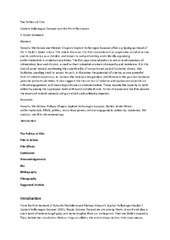The Politics of Film: 'Captain Volkonogov Escaped' and the Art of Resistance
Permanent lenke
https://hdl.handle.net/10037/33141Dato
2023-10-05Type
Journal articleTidsskriftartikkel
Peer reviewed
Forfatter
Robinson, P. StuartSammendrag
Natasha Merkulova and Aleksey Chupov's Captain Volkonogov Escaped offers a gripping portrayal of life in Stalin's Soviet Union. This article discusses the film's evocation of an oppressive social structure and its pertinence as a stimulus and means to comprehending and critically appraising authoritarianism in contemporary times. The film pays close attention to micro-level dynamics of intimidation, fear and division, as well as their potential counters of empathy and resistance. It is this kind of social realism, eschewing the superficiality of conventional period ‘costume’ drama, that facilitates speaking truth to power. As such, it illustrates the potential of cinema, as one powerful form of cultural expression, to harness the historical imagination and illuminate the parallels between past and present calamities. It also suggests that resistance of violence and oppression depends on cultural engagement, and hence boycotts are counterproductive. These impede the capacity to build solidarity among the oppressed, both within and outside Russia. Forms of expression like film provide the means of mutual understanding on which such solidarity depends.
Forlag
ApparatusSitering
Robinson PS. The Politics of Film: 'Captain Volkonogov Escaped' and the Art of Resistance. Apparatus. Film, media and digital cultures in Central and Eastern Europe. 2023;16Metadata
Vis full innførselSamlinger
Copyright 2023 The Author(s)


 English
English norsk
norsk
